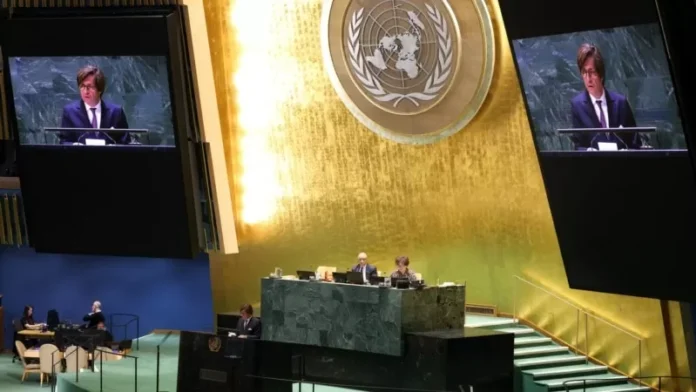The United Nations is gearing up for a crucial vote on Monday, as two drafted resolutions, one by the United States and the other by Ukraine with the backing of the European Union, call for an end to the ongoing war in Ukraine. This vote is set to take place at the U.N. General Assembly, with the U.S. resolution followed by the Ukrainian resolution. Later in the day, the U.N. Security Council will also hold its own vote on the U.S. resolution.
The resolution drafted by the United States calls for a swift end to the conflict and urges for a lasting peace between Ukraine and the Russian Federation. Secretary of State Marco Rubio has stated that this resolution will affirm the severity of the conflict, highlight the role of the U.N. in resolving it, and promote the vision of a peaceful future for Ukraine. This is a crucial opportunity to build momentum towards peace in the region.
On the other hand, the Ukrainian resolution provides a more detailed and comprehensive perspective on the situation. It emphasizes the devastating consequences of the Russian invasion which has persisted for three years and continues to threaten not only Ukraine but also global stability. The resolution calls for a de-escalation of the conflict, an early cessation of hostilities, and a peaceful resolution to the war. It also stresses the importance of ending the conflict by the end of this year.
The Ukrainian resolution also highlights the need for previous General Assembly resolutions to be fully implemented, including those calling for Russia to withdraw from Ukraine’s internationally recognized borders. Although General Assembly resolutions are not legally binding, they carry the moral weight of the international community.
In order for a resolution to pass at the Security Council, it needs the support of at least nine out of the 15 members, with none of the five permanent members (United States, China, Russia, France, and the United Kingdom) using their veto power. The U.S. resolution is expected to receive enough support on Monday.
U.N. Secretary-General Antonio Guterres has also spoken on the issue, stating that countries must do everything in their power to bring an end to the conflict and achieve a just and lasting peace, in accordance with the U.N. Charter, international law, and General Assembly resolutions. He urges all parties to come to the negotiating table and find a solution that benefits everyone.
Russian Foreign Minister Sergey Lavrov has stated that Russia is ready to negotiate with Ukraine and Europe, but will only cease hostilities when a sustainable and agreeable solution is reached. This highlights the need for continued efforts towards a peaceful resolution.
In light of these developments, French President Emmanuel Macron is scheduled to meet with U.S. President Donald Trump on Monday to discuss the ongoing conflict in Ukraine. Macron has emphasized the need for a strong stance against Russian aggression and for Ukraine’s sovereignty to be at the center of any peace efforts. British Prime Minister Keir Starmer is also expected to visit Washington later this week for similar talks.
In a show of support for Ukraine, a group of European leaders, including European Commission President Ursula von der Leyen, European Council President Antonio Costa, Canadian Prime Minister Justin Trudeau, Denmark’s Prime Minister Mette Frederiksen, and Spain’s Prime Minister Pedro Sanchez, visited Kyiv on Monday. Von der Leyen stated, “We are in Kyiv today because Ukraine is Europe. In this fight for survival, it is not only the destiny of Ukraine that is at stake. It is Europe’s destiny.”
Meanwhile, the European Union has approved a new round of sanctions against Russia, including measures against ships that work to evade restrictions on transporting certain goods, banks that circumvent sanctions, and equipment used to pilot drones. Kremlin spokesperson Dmitry Peskov has called these sanctions “entirely predictable” and accused European nations of prolonging the war in Ukraine.
Despite these efforts for peace, fighting continues in the region. Russia claimed to have shot down 23 Ukrainian drones overnight, while Ukraine’s military stated that they shot down 113 out of the 185 drones used by Russia. The conflict has also resulted in collateral damage, with the falling debris from a downed Ukrainian drone causing a fire at an industrial enterprise in the Ryazan region.
In conclusion, the upcoming votes at the United Nations and the continued efforts of world leaders to find a peaceful resolution to the war in Ukraine demonstrate the international community’s commitment to ending this conflict. The U.N. General Assembly’s vote will send a strong message to all parties involved that the international community

